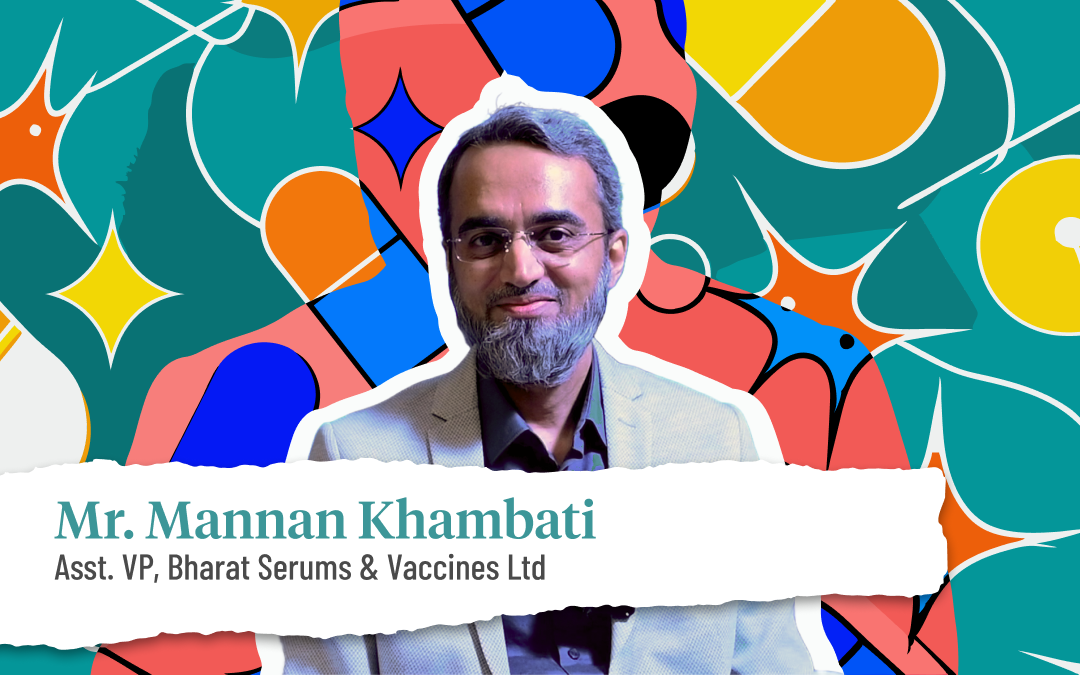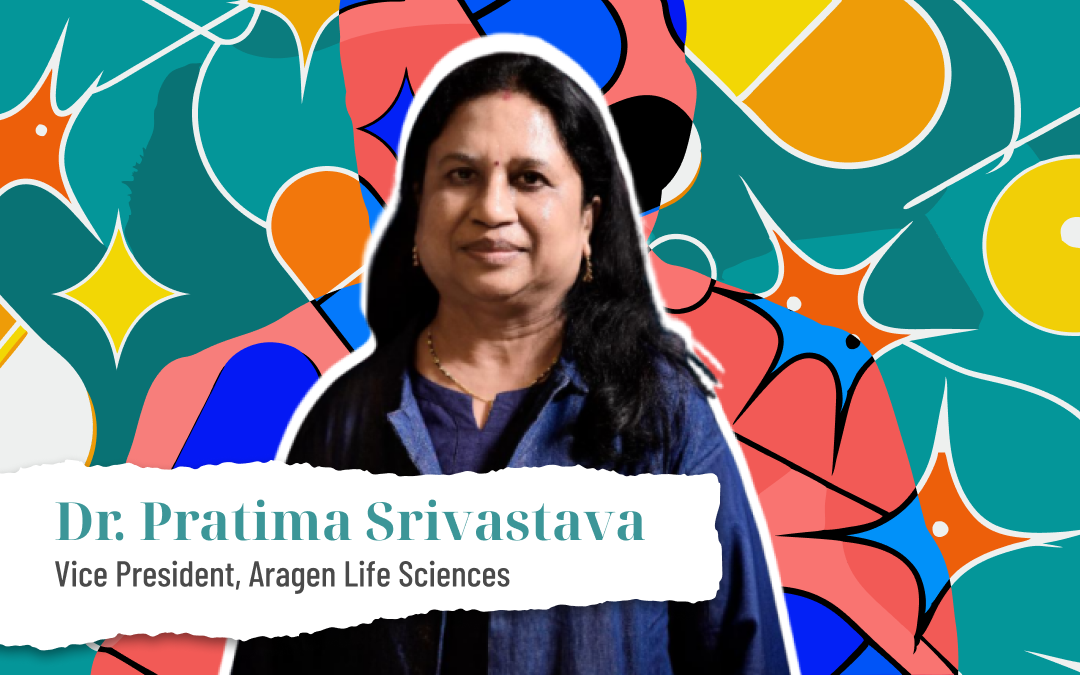QnA
Interview | November 23, 2024
Dr. Mahesh Bhalgat is the Group CEO & Managing Director of Veeda Lifesciences, bringing over three decades of leadership across pharmaceutical, biotechnology, CRO, and CDMO sectors. He holds deep expertise in operations, quality, regulatory affairs, process development, project management, and capital expansion. Before Veeda, Mahesh held senior roles at Syngene (as COO overseeing discovery, development, and manufacturing), Sanofi (including Executive Director and Site Head roles), and multinational stints in the U.S. after earning his Ph.D. in Medicinal Chemistry from the University of Utah. Under his leadership, Veeda is scaling globally through AI, real‑world data, and high‑quality clinical biology services, reinforcing India’s position in drug development and life‑science innovation.
Dr. Mahesh Bhalgat is a distinguished leader in the pharmaceutical industry, currently serving as the Group CEO of an integrated CRO business. With a career spanning over three decades, he has made significant contributions to pharmaceutical research and development, operations, and regulatory excellence. Dr. Bhalgat has held prominent positions at organizations like Syngene International, Shantha Biotechnics (a Sanofi Company), and Amgen, where he demonstrated exceptional leadership in quality, analytical development, and process innovations. Renowned for his expertise in biopharmaceuticals and technology transfer, he has been instrumental in driving strategic growth and operational efficiency across global pharmaceutical enterprises.
A Ph.D. graduate in Pharmacy with specialization in Medicinal Chemistry from the University of Utah, Dr. Bhalgat is celebrated for his thought leadership and technical acumen. He also holds a B. Pharm degree in Pharmaceutical Sciences from the University of Mumbai. His unwavering commitment to innovation and excellence has not only established him as a trusted name in the pharma industry but has also garnered widespread respect for his mentorship and ability to bridge science and business. Dr. Bhalgat's vision and passion continue to shape the future of pharmaceutical development and contract research globally.
Pharma Now: Hello, Dr. Mahesh Bhalgat, and welcome to Pharma Now. I know you’re a renowned person in the industry, Dr. Mahesh, as the Group MD of Veeda Clinical Research, a renowned contract research organization (CRO). That’s why we wanted to do a complete walkthrough of your journey. It’s a pleasure to have you here with us, and we would love to know about your journey in detail. So, my first question is: from growing up in Mumbai to the United States and becoming a Group MD of Veeda Clinical Research, how has your journey been? Can you tell us a little about all the roles you’ve played?
Dr. Mahesh: One thing that was very important to me throughout my journey was: I always wanted to impact human lives. This goal, this thought, brought me towards the medical and paramedical field, which is what I chose to study for my graduation in Mumbai at the Bombay College of Pharmacy. After completing my graduation, I went to the US. There, I completed my PhD and continued research, looking for ways to tackle one of the most challenging research areas: oncology. I had the opportunity to work with antibody-drug conjugates as part of my PhD at the University of Utah in Salt Lake City.
In the US, I worked for several companies. I worked in the large molecule space for all my career. This helped me because, today, when we look at the research direction and trend, whether it's in universities or industry, it's heading towards large molecules. Therefore, for me, that is almost opportunistic, because I have already worked in the "large molecule and biopharmaceutical monoclonal antibody proteins" space.
The last company I worked for in the U.S. was Amgen as a Director, the world's largest biotherapeutics manufacturing company with a robust pipeline of new products. Then, I took the plunge from Amgen to Biological E., which everyone is familiar with now after the vaccine development in India.
I have also worked as a Chief Operating Officer (COO) at Sanofi after Sanofi acquired Shantha Biotechniques. I took on a role as the COO of Sanofi, which once again kept me in the vaccine and large molecule space. But, this was a much broader role because this enterprise was focused on meeting Sanofi's manufacturing needs in the Asia-Pacific region. So, at that time, we had lots of products that were either on the shelf or were not approved for several reasons.
Looking at them, I thought, "What can we offer the Indian environment from Sanofi?" So, I had a good time there, with almost a 10-fold growth in revenue over the six years that I spent with Sanofi. Then, I moved to Syngene. Syngene is another large enterprise, probably India's largest CRO/CDMO that works on small and large molecules with different modalities, covering everything from discovery to developmental manufacturing. I was the Chief Operating Officer at Syngene, and we grew the enterprise to 8000-8500 people and a USD 3 billion market cap. I think one of the major transformations at Syngene in the last few years–which I have been a part of–is moving it from a pure CRO or a highly focused CRO to a CRO and CDMO.
It’s been an exciting journey for me. Most recently, I joined Veeda Clinical Research as their Group MD. We have three group companies that are part of the organization. There is a preclinical part, referred to as Bioneeds. It's an entity in Bangalore, India, that does toxicological services safety assessments and serves the pharma and agro industries. Then, we have Veeda, the parent organization, which works with generics and healthy volunteer services. After I came on board, we recently acquired a unit in Europe, initially called Heads, now called Veeda Europe, headquartered in Ireland. In oncology, we have staff in Ireland, Greece, and Italy who do clinical trials with patients using novel molecules, primarily antibodies.
So, my journey has been from working with antibodies during my PhD to working with companies like Amgen in the US. Then, I came back and worked on vaccines in India and continued to build an enterprise, a knowledge base and an ecosystem in India through companies like Syngene and Veeda which are service providers. So, my journey has impacted a lot of client partners, and it has been exciting work.
Pharma Now: It’s amazing to hear of all prominent roles you’ve worked on. Speaking of your Bachelor’s in Mumbai, I think you completed your Bachelors in Pharmacy in the late 1980s. In my opinion, at that time, B. Pharm wasn’t that famous and very few people opted for this field? So, what made you opt for this degree?
Dr. Mahesh: I wanted to be associated with healthcare, but at the same time, I did not want to be a doctor.
Pharma Now: But, why were you keen on working in the healthcare field? What was so unique about this field that attracted you?
Dr. Mahesh: It's the best way to impact human lives. If you think your life has a purpose, you have to decide what that purpose is. In my childhood, I knew I wanted to be associated with healthcare. But, I also knew that I did not want to be a doctor. So, if I didn’t want to be a doctor, what's the other thing I could have done to impact lives? I could have developed medicines for patients. So, the pharmaceutical training we offer in India has evolved even more than when I was a student. Now, it is pretty unique and diverse. We cover everything from drug production to drug discovery and understanding how drugs work in our body.
So, if you’re studying now, you understand the drug metabolism and elimination in the human body, you understand design drugs, and you also learn how they are manufactured, tested, and approved so that high-quality drugs are provided to patients. So, when you’re going through this rigorous education and working in this field, you're making a difference to patients who need help, need treatment. I believe that it’s impressive how you can impact human lives through healthcare, and few professions can impact so many people so directly.
Pharma Now: I couldn’t agree more with you! I understand that you’ve had a very unusual career path. You stayed in the US for approximately 20 years, and then came back to India. So, what made you come back to India?
Dr. Mahesh: When you're in the US as an Indian, you always have one thought: “Do I want to be here forever, or do I want to go back to India?” Some people are clear when they think, “I want to stay here and never return.” Others are very clear, “I'm going back.” But along the way, some people falter and say, "Well, maybe I don't want to go back. I thought I wanted to return, but I didn't.”
I will say, I was one of those people. But eventually, you think about what's valuable for you. If your interactions with people are important for you, then you think, “Well, where am I going to get more of that? Where am I going to make a more significant difference?” If you believe you will make a more substantial difference by being in an Indian environment, that is what you should do, and that’s what I wanted to try out.
Therefore, I thought, “I have an excellent job at Amgen, a huge, reputable company with a good role. I spent my time in Amgen. I actually work in three different areas: I worked in analytical development, which was part of the process development group. I worked in analytical sciences as part of a site that supports manufacturing. I also worked in a quality organization. So, I covered quite a bit of ground in terms of understanding the opportunities, even in a large company like that. And, that’s OK. But, I think I can make a bigger impact by being in India." So, this thought brought me and my family back to India.
Pharma Now: That's wonderful thought, and I daresay, you’ve made great strides towards this goal. You have been an advocate for vaccines and the good impact of vaccines. In your last lecture, you discussed connecting the dots between vaccines and antibiotics. So, what do you think, why are vaccines becoming so crucial for the global healthcare system?
Dr. Mahesh: If you think about the burden we face as a planet today, a few things are very obvious on a large scale. One of those is what everybody is talking about today: global warming. But not enough work is happening to solve global warming, right? But, the second thing is antimicrobial resistance.
According to me, these are things that we can solve as a community. Why and how does antimicrobial resistance originate–that’s a front-and-center opportunity. It happens because of the rampant, widespread and extensive use of antibiotics. Antibiotics are being used as prophylactics. But, that's not the main purpose of antibiotics. They are also not entirely used from a therapeutic implementation perspective, where patients decide to drop antibiotics midway through a course.
So, there are several different reasons why antibiotic resistance is increasing, but the continued usage of antibiotics is further going to increase antibiotic resistance, leading to what is called hospital-lead infections. If we can tackle these kinds of microbes, we can help people. These are all microbes, and these are what vaccines can work on–they remove microbes. We can reduce the need for antibiotics by removing microbes from our environment.
Pharma Now: But, removing microbes and eliminating them completely seems difficult. Is it really possible to achieve this, and has this been done before?
Dr. Mahesh: Is it possible? Yes, but it's not easy. But, it's something that we have to work on. For example, at some point, nobody thought that smallpox could be eliminated or eradicated from the planet. Polio is another example; it is recent and has gone through a dramatic journey of eradication in almost all parts of the world. So, can you achieve targets that were unthinkable at some point? I believe so.
We need to look at antimicrobial resistance from a much more holistic perspective, starting with the whole approach of antimicrobial stewardship, which is the first place to start. However, there are many different elements, and I believe the vaccine industry also has a role to play.
Pharma Now: When you put it this way, yes, I believe we can achieve it. Has anyone started taking steps towards solving antimicrobial resistance?
Dr. Mahesh: Some companies and researchers are developing programs to understand the relations between bacteria or organisms that lead to antimicrobial resistance.
When studying these situations, you think, "What is the environment that bacteria are living in, how should I tackle this environment, and what are my options for tackling the environment?” Then, vaccine components that start to fit in. Unfortunately, the journey is not easy, but launching any solution for disease in our segment is always challenging.
Pharma Now: I agree. You mentioned global warming and connected antimicrobial resistance to it, can you elaborate more on how they are related?
Dr. Mahesh: Think about global warming; because of global warming, world habitats are changing. Species are interacting more frequently, which didn’t happen before. These interactions will continue because the opportunity for the ecosystem of the planet is limited. There are going to be more areas where you can’t live because of the temperature changes. We are going through this today! We already think “Man, you can't live in city A or city B because it's so hot there.” Or, we think “I don't want to go there during this season because it's so hot.” So, we’re localizing ourselves in fewer parts of the planet. This is what brings species closer, leading to more interactions.
As species come closer, there’s going to be a risk of more cross-species transmissions. Understanding and preventing the risk of cross-species transmission using vaccines will impact viral diseases–and this is an opportunity for the vaccine industry to make a difference. So, to understand what the interconnected dynamics are, studies are being performed. Data generation teams worldwide study animal migration. When you study the migration patterns of some of the well-known species, you understand how their patterns have changed over the last 100 years. Whales, for example, help you explain the changes. For example, because the temperature of the planet is changing, Whales’ migration patterns are changing. So, by understanding these migration patterns, we can learn more about interactions, cross-species transmission and then develop vaccines against potential diseases.
Pharma Now: Fascinating. I think your perspective is very interesting. I think you are the first person who is connecting global warming and vaccines, and as more people understand your perspective, I think we’ll see real change. Coming back to technological advancements in vaccines, a new technology that everyone is discussing is mRNA. So, can you explain how this “next-big tech” as everyone is calling it will play a role in vaccines?
Dr. Mahesh: Before I answer that, let me mention one more thing about global warming: I think everybody needs to think about global warming, not just the vaccine industry. Our philosophy, our environment in Veeda, is to think, “what can we do to impact sustainability?” The smallest, simplest thing we don't necessarily think about is, can I eliminate plastic from my consumption one bottle a day? Can I eliminate plastic when buying fruits and vegetables at the grocery store? While the vaccine industry has another opportunity, we are also bringing these sorts of implementations into their testing environment, which is what we do in Veeda.
Coming back to your question on mRNA. I think mRNA technology is significant for us because it's a different way of delivering a vaccine. In a typical vaccine, you provide the antigen, which is the component that makes your body produce antibodies against the bacteria. You're telling the body this is what you are protecting me against. Once this knowledge is provided to the body, it’s not necessary to provide it again in your lifetime. If you ever encounter the same problem again, your body ensures you already have antibodies needed. This is what a vaccine does.
So, what does an mRNA vaccine do, or what does mRNA technology do? mRNA technology doesn't introduce this exact antigen into your body. Instead, it provides proteins to your cells to make the antigen. So, it turns your cells into factories, making them act as your antigen-making factories. Therefore, this helps your body become more ready to tackle issues.
Pharma Now: So, the inherent method of functioning is very different in an mRNA vaccine. But, what are the benefits of mRNA and why is it being so aggressively studied?
Dr. Mahesh: There are several benefits. First, mRNA and proteins are different to manufacture. You can make mRNA in fewer steps than a protein. This is because you first need the gene of interest to make a protein. Then, you make the protein, purify it, and so forth. In mRNA–I'm oversimplifying, of course–you just make the template and use that. You're not doing protein manufacturing and downstream technology.
After templating, you get the opportunity to call it my technology. Once you know it works for a certain protein, you can use it for anything else by changing the gene or protein it’s targeting. For example, today, it could be targeting chikungunya protein. Tomorrow, it can target a protein for typhoid. This transferability is fast. So, in a pandemic where you want vaccine doses to be delivered rapidly, fewer steps are needed. You need to do fewer steps for optimisation and for combining mRNA and envelope it into a carrier. Unfortunately, you can't inject plain mRNA into the body. Instead, you have to inject mRNA into a nanoparticle. If that is all standardized and you just change the gene, the vaccine development process is much shorter, making it much more effective. This is, of course, just one component of impact.
mRNA vaccines can be used even for diseases like cancer. mRNA concepts are also much more amenable to customized therapies, which can address our current needs in personalized medicine. So, there are several different things that we have to look at. Of course, nothing is foolproof; nothing is perfect. Much work still needs to be done, but these are all high-potential opportunities.
Pharma Now: That’s fascinating to hear, and I can understand why mRNA is taking the center stage. On a global perspective, today, you are leading a major company in India. Do you think India has the potential to be a vaccine leader? Where do you think we stand in terms of vaccine manufacturing or overall innovation?
Dr. Mahesh: I think that this is an excellent and important question because India is a leading manufacturer of vaccines. But, we're the leading manufacturer of some selected number of vaccines, and we do that on the lower end of the value chain. We have volume, but we don't have value. In terms of volume, we are big. In terms of value, we need to get bigger.
This is an opportunity for us to say, “How do we go after even more valuable vaccines by showing our progress in our technological development?” Instead of only reproducing what we've been doing. The other opportunity is that some diseases are very well understood from the demographic impact perspective, but not all of them. We must focus on essential diseases for different parts of the world where the value can also be realised. They may only be for India sometimes. For India, we can always work on volume. For other parts of the globe, we must look at value. So, we need to look at this industry by capturing both segments with a mix of innovation and routine manufacturing.
Pharma Now: That’s true, and I think our readers will also agree with this. It’s been wonderful chatting with you, but sadly, our time together seems to be coming to an end. So, let me ask you one final question: Today, you’re the Group MD of Veeda. Can you share a little more about Veeda’s work? And in this position, are you realizing your childhood dream?
Dr. Mahesh: So, at Veeda, our preclinical team helps identify suitable product candidates that need to be considered for development and manufacturing. We need to know that they are effective and don't have any toxicity. That's what our preclinical group, called Bioneeds, does. Bioneeds is based in Bengaluru. The clinical group, which is based in Ahmedabad, studies generic drugs. They make sure generic drugs have the correct profile after biodistribution in the body. They make sure the proper levels of the drug are present in the body after ingestion. They perform trials and bring correct data. The clinical trial organization, which is in Europe and even in India, is looking at novel drugs. It answers questions like Is the drug effective? Is it getting the level of efficacy and safety that is needed? Is it then influential in the right population? When should it be given? Should it be provided within a specific age category or in certain disease profiles?
As you know we have a significant focus on oncology. So we ask, Is it right for these types of oncology patients? We are creating value for our clients and partners by overlying tech and data. Tech and data are essential for bringing efficiency into any operation. Real-world data opportunities lead to even faster opportunities for getting products onto the market. You can identify, enroll, and check whether the drug works well by going to targeted areas and specific patients.
We are integrating tech in other parts as well by ensuring that data capture is much more automatic and ensuring that the data quality is immediately checked so that there are any components of data that need to be of the right quality. You redesign the experiment, restart the experiment, and take that opportunity up in terms of digital systems and digital implementation.
The last part answers your question: Are you realizing your dream of making an impact? We're also starting a group within Veeda focused on biologics development. The biologics sector is the future of the therapeutic industry. We are working on analytical characterisation packages and comparability packages. We’re working on novel biologics and biosimilar development so that we support even the part of the industry that may or may not be ready to do their clinical trials but are prepared to do their preclinical work with us.
Pharma Now: Best wishes for your mission. We are here as Pharma Now to amplify that, and we will help you wherever needed. Thank you very much for taking the time to talk to us and share your knowledge. It has been a pleasure interviewing you.
Dr. Mahesh: Thank you, it's been a pleasure.

FT - Dr. Subhash Thuluva

FT - Ms. Rajni Jha

FT - Mr. Mannan Khambati

FT - Dr. Pratima Srivastava

FT - Dr. Subhash Thuluva
Dr. Subhash Thuluva, Senior VP at Biological E, shares his 25-year journey in clinical development, ...

FT - Ms. Rajni Jha
Ms. Rajni Jha, a seasoned pharmaceutical specialist, shares her journey from the lab to becoming a l...

FT - Mr. Mannan Khambati
Mr. Mannan Khambati, AVP of Biotech Manufacturing at Bharat Serums and Vaccines, shares his inspirin...

FT - Dr. Pratima Srivastava
Dr. Pratima Srivastava, Vice President at Aragen, shares her remarkable journey from aspiring scient...